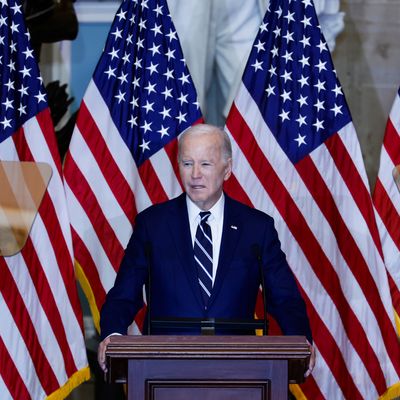

Has this man tried to overthrow the government?
Photo: Anna Moneymaker/Getty Images
“Slippery slope” arguments are important in the Supreme Court’s constitutional jurisprudence since the Court sets precedents that will be followed in a wide range of circumstances. Anticipating those circumstances and where they may lead is essential in tailoring decisions that go no further than necessary to resolve cases before the justices.
But in the oral arguments for Trump v. Anderson, involving Colorado’s decision to bar Donald Trump from the ballot as an “insurrectionist” under the authority of the 14th Amendment, a particular slippery-slope fear has emerged that is a bit startling when you think about it. In questioning Jason Murray, counsel for the Colorado voters who sought Trump’s exclusion, Chief Justice John Roberts wanted to know if other states might retaliate by excluding Joe Biden on the same grounds:
If Colorado’s position is upheld, surely there will be disqualification proceedings on the other side. And some of those will succeed.
I would expect that, you know, a goodly number of states will say, whoever the Democratic candidate is, you’re off the ballot. And others for the Republican candidate, you’re off the ballot. It’ll come down to just a handful of states that are going to decide the presidential election. That’s a pretty daunting consequence.
Murray promptly described the possibility of states disqualifying Biden as an insurrectionist as a “frivolous application of a constitutional provision,” but Roberts interrupted:
Well, now, hold on. You might think they’re frivolous, but the people who are bringing them may not think they’re frivolous. Insurrection is a broad, broad term. And if there’s some debate about it, I suppose that will go into the decision and then eventually, what, we would be deciding whether it was an insurrection when one president did something as opposed to when somebody else did something else? And what do we do? Do we wait until near the time of counting the ballots and sort of go through which states are valid and which states aren’t?
This wasn’t just a matter of Roberts being argumentative. To some extent, liberal Justices Elena Kagan and Katanji Brown Jackson have shared his concern about a need for uniformity in the face of states that may have widely varying standards for disqualifying presidential candidates. Murray struggled again and again to point out the obvious: Neither Biden nor any other president in the history of the Republic has undertaken conduct similar to Trump’s effort to overturn an election result and obstruct the orderly transition of power via acts of violence and physical intimidation of Congress. That’s what makes Trump at least arguably, but in any case uniquely, subject to the kind of sanctions the 14th Amendment designed for the rebels of the Confederacy.
What might have been in the minds of the justices is the incredible fact that Trump and his backers have indeed tried to argue that by pursuing policies they don’t like, Biden himself has become an insurrectionist. On the third anniversary of his own January 6 treachery, Trump told Fox News Digital, “The only insurrection is the insurrection that is taking place at our border where he is allowing millions of people from parts unknown to invade our country at a level far worse than even a military invasion.” And the threat of a red-state retaliation to any denial of ballot access for Trump isn’t strictly hypothetical: It was articulated by the lieutenant governor of Texas, Dan Patrick, as The Hill reported in December:
“Seeing what happened in Colorado tonight … makes me think — except we believe in democracy in Texas — maybe we should take Joe Biden off the ballot in Texas for allowing 8 million people to cross the border since he’s been president, disrupting our state far more than anything anyone else has done in recent history,” Patrick said in an interview with Fox News anchor Laura Ingraham.
Similarly, Missouri secretary of State Jay Ashcroft argued that Biden’s border-enforcement policies constituted an “insurrection” just as much as Trump’s inciting a mob to attack the Capitol:
So does this absurd analogy coupled with a threat justify Roberts’s fears and require quashing Colorado’s ballot-disqualification decision? Perhaps. But it will also in the future encourage insurrectionists and their enablers to argue in their defense that everybody does it. We’re already pretty far down a slippery slope to legal and moral relativism.






